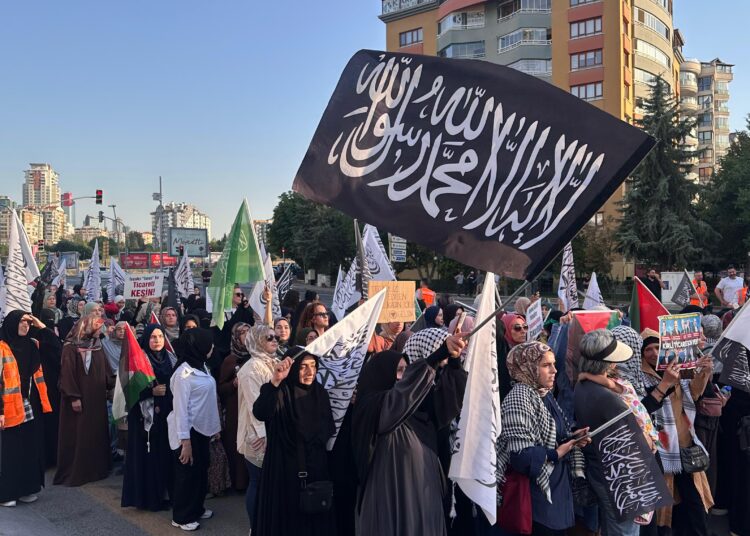Abdullah Bozkurt/ Stockholm
Radical jihadist groups, emboldened under the increasingly permissive climate fostered by Turkey’s Islamist leadership, have turned their attention toward the presidential palace in Ankara, demanding decisive action against Israel.
Hizb ut-Tahrir, a terrorist-designated pan-Islamist group that advocates for the re-establishment of a global Islamic caliphate, orchestrated a provocative rally in the Turkish capital on July 27. Organized through its front group Köklü Değişim (Radical Change), the protest drew together a nationwide network of jihadist factions to demonstrate outside President Recep Tayyip Erdogan’s presidential complex and the headquarters of the ruling Justice and Development Party (AKP).
Among the participants was a group led by Halis Bayancuk (alias Ebu Hanzala), a key figure in radicalizing Turkish youth to join al-Qaeda and the Islamic State in Iraq and Syria (ISIS). Although Bayancuk has been indicted multiple times and convicted on ISIS-related charges, he was released from prison in July 2023. He now openly operates under the banner of the Tevhid Dergisi (Tevhid Magazine), running multiple branches and preaching freely across Turkey.
Other groups that joined the rally included Siyer Vakfı (Foundation for the Study of the Prophet’s Biography), led by preacher Muhammed Emin Yıldırım, and Kurana Nebevi Davet Derneği (Association for Prophetic Invitation to the Quran), headed by Ahmet Turgut Ulucak.
Despite a ban imposed by Ankara’s governor, who cited the unsanctioned protest route near high-security government institutions, the demonstrators defied the restriction and assembled in the capital. Chanting slogans such as “Israel must be wiped out” and “Turkish troops to Gaza,” the protesters carried placards demanding both military intervention and the restoration of the caliphate.
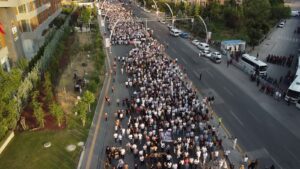
Although Turkish police blocked their path to the presidential palace, the group was permitted to demonstrate in front of the Israeli and US embassies. This occurred despite the protest being officially designated as unlawful.
Mahmut Kar, the head of Hizb ut-Tahrir in Turkey, used the occasion to call out Erdogan directly. “If you are not going to use the power and means at your disposal today, then when will you?” Kar asked. “If this army will not mobilize today for our brothers and sisters in Gaza — who are dying of hunger, trying to survive by eating dirt — then what will it mobilize for?” he said.
In a press statement for the rally, Hizb ut-Tahrir issued a series of demands, including the immediate severing of all diplomatic, military and economic ties with Israel, the closure of Israeli diplomatic missions in Turkey and the expulsion of Israeli diplomats. They also called for the shutting down of the NATO radar base in Kürecik as well as Incirlik Air Base, which hosts US forces. The statement further demanded that dual nationals who have served in the Israeli military be stripped of Turkish citizenship and deported.
Rejecting the two-state solution, the group insisted that the entirety of Israel be reclaimed as Muslim Palestine. The demonstrators expressed frustration with Erdogan for limiting the scope of the protest, revealing a growing tension between the president and the radical Islamist factions that have long been part of his political base.
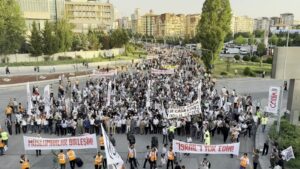
The protest underscores a volatile dynamic. The jihadist forces Erdogan once quietly tolerated are now turning their demands inward, expecting action that the Turkish government cannot or will not deliver. The Erdogan administration may now be grappling with the consequences of enabling extremist actors whose ambitions extend beyond political Islam and into an outright theocratic revolution.
Hizb ut-Tahrir’s presence and influence in Turkey have grown significantly since Erdogan’s rise to power in the November 2002 general election. The group has long blamed the Turkish Republic, the secular successor to the Ottoman Empire, for the abolition of the caliphate in 1924. This historical grievance is one President Erdogan has also echoed for private audiences.
Capitalizing on the recent conflict between Israel and Hamas, Hizb ut-Tahrir has intensified its campaign for the re-establishment of a global Islamic caliphate. The group explicitly rejects secular democracy, positioning itself as a revolutionary force. Its members have been linked to ISIS, raising alarms that the organization could serve as a gateway for deeper radicalization.
Although Hizb ut-Tahrir remains banned in Turkey and was officially designated as a terrorist organization by the Supreme Court of Appeals in multiple rulings since 2004, it has experienced a resurgence under Erdogan’s rule. The group has held large-scale events in Ankara and Istanbul with minimal interference, and its international operatives have used these gatherings to call for a new caliphate.
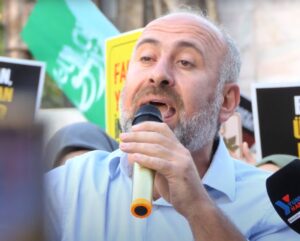
Operating through a media and publishing company named Köklü Değişim Medya Basın Yayın Organizasyon Ticaret Limited Şirketi, which was founded in Ankara in December 2016, the group has made itself more visible. Kar is listed as the sole founder and authorized representative of the firm.
Hizb ut-Tahrir’s history in Turkey dates back to the late 1960s. Its members have faced arrest and prosecution under various governments. A 2009 police raid uncovered firearms, including long-barreled rifles and pistols, suggesting that the group might resort to violence when the political climate was favorable. A planned attack to mark the anniversary of the caliphate’s abolition was reportedly thwarted that year.
Surveillance operations and wiretaps have revealed discussions about jihad and travel to Palestine among Hizb ut-Tahrir members. Some were found to have links with ultranationalist elements in the Turkish military and intelligence services, indicating a convergence of anti-democratic forces with shared goals of destabilizing the secular state.
A 2011 investigation uncovered financial ties between Hizb ut-Tahrir’s Turkish operations and foreign funders, including Imameddin A.A. Barakat, a Jordanian businessman of Palestinian origin. Records showed regular cash deliveries to Istanbul operatives, smuggled in by couriers such as Mazin Harbawi, totaling approximately $40,000 per visit.
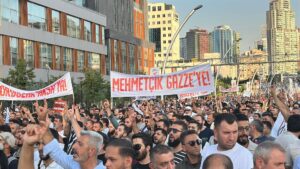
According to a 2017 report by Turkey’s Directorate General of Security, Hizb ut-Tahrir functions through a covert leadership structure consisting of a secretive committee of up to 10 people who report to a so-called presidential council.
Despite multiple rulings by the Supreme Court of Appeals reaffirming Hizb ut-Tahrir’s terrorist designation, Turkey’s Constitutional Court rejected this designation in July 2018, under pressure from Erdogan’s government. The ruling, which exceeded the court’s legal mandate, effectively allowed members of Hizb ut-Tahrir to escape prosecution, deepening the legal ambiguity around the group’s status.
This judicial about-face has emboldened Hizb ut-Tahrir to continue its activities and left Turkey’s security institutions fragmented in their response. While some courts still treat the group as a terrorist entity, others now follow the Constitutional Court’s precedent, allowing its members to operate with near impunity.
What is unfolding in Turkey is a cautionary tale. In cultivating jihadist sympathies to consolidate his Islamist base, President Erdogan has given rise to a force beyond his control — one that now challenges his authority and the founding principles of the Turkish Republic.

